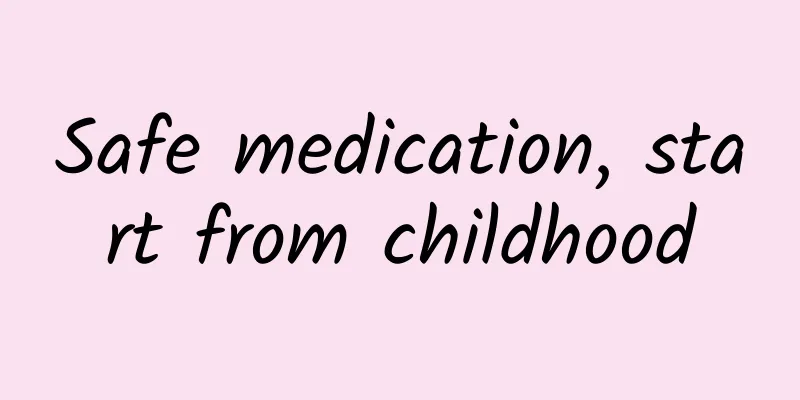Safe medication, start from childhood

|
With the development of society, children use medicine more and more frequently. However, due to the lack of necessary knowledge of medication, the irrationality of children's medication is increasing, which seriously affects the healthy growth of children. I believe that many parents have such experience: sometimes when children are sick and it is inconvenient to see a doctor or buy medicine at night, they will take the adult medicines at home for their children. Because there are no children's special medicines when taking medicine, 1/2 or 1/3 of adult medicines are often used according to experience. When children are sick, antibiotics, antipyretic analgesics, nutrition and health care drugs are used according to experience without a clear cause. Is this right? Listen to what the pharmacist says. Because children have immature liver and kidney functions, weak liver detoxification function, and poor kidney detoxification function, people need to be more cautious and careful when using medication. Children should follow the following basic principles when using medication: 1. It is best to choose medicines specifically for children Most of the clinical trial data of drugs are conducted on adults, so there is a lack of data on the effectiveness and safety of drugs for children. Children are not smaller versions of adults. Adults have completed their development, while children are still in the process of development. Therefore, children and adults get sick in the same way, but the choice of drugs is different; not only oral medications need to be taken care of, but there are also big differences between children and adults in the choice of topical drugs for skin. The keratinized layer of the skin of newborns and infants is thin, and topical drugs are more easily absorbed through the skin and systemically, especially when the medication area is large and the skin is damaged, excessive drug absorption may cause systemic adverse reactions or even poisoning. For the above reasons, it is best to use children's special drugs for children, and adult drugs cannot be directly used for children. 2. When choosing drug treatment, the characteristics of children's medication should be fully considered. The selection of drug dosage forms for children's medication needs to fully consider the characteristics of children's medication. Taking oral medications as an example, liquid preparations such as solutions, syrups, suspensions, etc. are more convenient for children to take, and are also convenient to accurately take the amount according to the dosage requirements. They are the most suitable dosage forms for children's oral medication; other dosage forms that can be converted into liquids, such as granules, dry suspensions, dispersible tablets, etc., are also dosage forms that are more friendly to children; and enteric-coated, sustained-release and controlled-release drugs need to be used as whole tablets/grains and cannot be broken, so they are not suitable for younger children. At the same time, when conditions permit, children's medications should also fully consider the taste of the drug. For example, choosing drugs with added fruit flavoring agents is more acceptable to children. 3. Carefully calculate the dosage of medication and do not increase or decrease the dosage at will Deviation in the dosage of children's medication is the most common medication error in children, mainly because the dosage calculation method for children is more complicated than that for adults. In addition to being related to the disease and the liver and kidney function status of children, the dosage of children's medication is also related to age, weight, etc. Therefore, when giving children medication, be sure to carefully check the method of taking the medicine bag and the usage and dosage information in the drug instructions. It is understandable that parents hope that the medicine can cure the disease immediately, but it is not advisable to increase or decrease the dosage of the drug at will. Increasing the dosage of the drug at will may cause poisoning due to overdose, and reducing the dosage may not achieve the therapeutic effect. The dosage of the drug taken each time is based on a large amount of clinical experimental data, and the dosage of different drugs varies greatly. It cannot be simply decided by doubling or halving. When giving children medication, parents must follow the dosage recommended by the doctor or pharmacist and cannot arbitrarily change the dosage of the drug, stop the drug, or extend the time of taking the drug. 4. Be careful not to take the medicine by mistake The primary cause of drug poisoning in children is the accidental ingestion of medication. Accidental ingestion of medication is more likely to occur in children aged 1 to 4 years old. This is mainly because children of this age group are active, curious, imitative, and lack the ability to identify danger. Asking younger children to help parents get medicine, or tricking children into taking medicine by calling it candy (sugar water) is dangerous and can easily mislead children. At the same time, parents have poor safety awareness and place medicines at random, which can easily lead to children taking medicine by themselves. Therefore, medicines at home must be placed where children cannot easily touch them. For older children, parents should provide them with appropriate medication safety knowledge education to improve children's relevant identification ability. Drugs that children may abuse 1. Antibiotics The abuse of antibiotics is mainly manifested in the use of them without clear bacterial infection, such as colds and fevers (viral infections). In particular, you need to be careful when using the following medicines: 1. Avoid using antibiotics with obvious ototoxicity and nephrotoxicity, such as gentamicin, streptomycin, vancomycin, etc. They should be used under the guidance of a doctor unless necessary, and adverse reactions should be closely observed during treatment. 2. Tetracycline can cause yellowing of teeth and hypoplastic enamel and should not be used in children under 8 years old. 3. Quinolone antibiotics such as ciprofloxacin and ofloxacin should be avoided in minors under 18 years of age due to possible adverse effects on bone development. 2. Antipyretic and analgesic drugs Improper use can easily cause collapse or shock in children. Antipyretics are not recommended for children under 3 months old with a body temperature below 38.5℃. Physical cooling methods can be used to reduce the temperature. If the body temperature is ≥38.5℃, medical attention should be sought in a timely manner. Children over 3 months old with a body temperature ≥38.5℃ or who are obviously unwell are recommended to use medication. 3. Nutrition and health care drugs 1. Excessive use of vitamins can easily lead to poisoning or ineffective treatment. Cod liver oil is a typical example. Eating too much cod liver oil will cause storage poisoning in the body and cause symptoms such as fever, anorexia, and irritability. 2. Nutritional products with hormone-like ingredients. Some businesses add hormone-like ingredients to health products, which may cause precocious puberty in children. 3. Immunoglobulin and various preparations that regulate immune function. Sometimes parents will inject their children with immunoglobulin to prevent their children from catching a cold. This behavior is also wrong. 4. Calcium, iron and zinc are essential trace elements for children's growth and development, but they cannot be supplemented blindly. For example, excessive intake of calcium supplements will cause premature calcification of children's bones, which will affect their normal growth and development. 4. Chinese medicine tonic Blindly taking supplements will not only fail to promote children's health, but will lead to many adverse reactions. For example, ginseng and royal jelly can cause children to gain weight, precocious puberty, and endocrine dysfunction. It will also increase the risk of coronary heart disease, arteriosclerosis, and diabetes in adulthood. Finally, we call on parents to pay attention to children’s medication safety and work together to protect children’s health! References: 1. Jin Zhimin. Discussion on the intervention of health education to reduce irrational use of antibiotics in children. Zhejiang Clinical Medicine, 2008, 10(5) 625. 2. Xia Guojun (ed.). Guiding principles for clinical application of antimicrobial drugs. Beijing: China Medical Publishing House, 2004.48~49. 3. Xie Minghua, Wang Dingsheng, Cai Xinjun. Problems and countermeasures of pediatric medication [J]. Strait Pharmacy, 2009, Vol. 21 (12). 4. Liang Wenquan. Biopharmaceutics and pharmacokinetics [M]. Beijing: People's Medical Publishing House, 2000, 6. |
<<: Fecal treatment technology: a "wonderful adventure" of human microorganisms!
>>: Practice a healthy lifestyle and actively respond to severe cold weather
Recommend
Can I still have sex after a hysterectomy?
After the occurrence of uterine fibroids or other...
What are the benefits of taking Shenbao for women?
Shenbao tablets are a relatively common health pr...
What to do if there is fluid in the ovaries
Ovarian fluid accumulation is an important manife...
Heart and brain are interdependent: comprehensive application of ultrasound technology in heart and brain health
Author: Zhang Lei, deputy chief physician, Xuanwu...
What are the nutritional values of stewed pig's trotters? How many calories are in pig's trotters?
Pig's trotters are rich in protein, fat and c...
Why do my breasts hurt after every feeding?
Mothers often encounter some minor problems when ...
Use vitamin C effervescent tablets with caution, as overdose may cause gout!
Audit expert: Shen Yingjian Director of the Nutri...
Episiotomy wound redness and swelling picture
During a first-time natural delivery, some imperf...
Is it normal for leucorrhea to be watery and odorless?
Many women have little understanding of leucorrhe...
Do I need to take anti-inflammatory injections for uterine inflammation?
Inflammation of the uterus, also known as metriti...
How did Yuan Shao die in the Three Kingdoms? Who is Yuan Fang in the Three Kingdoms?
There are more than a thousand characters with na...
Can women have a physical examination during menstruation?
Whether you can have a physical examination durin...
It hurts my heart! My friends complained about it at the same time...
Author: Li Ping, pharmacist at Xiamen University ...
What is the reason for the red discharge down there?
Normal female secretions should be transparent or...
What are the treatments for polycystic ovary syndrome?
Polycystic ovary is a female disease that causes ...









